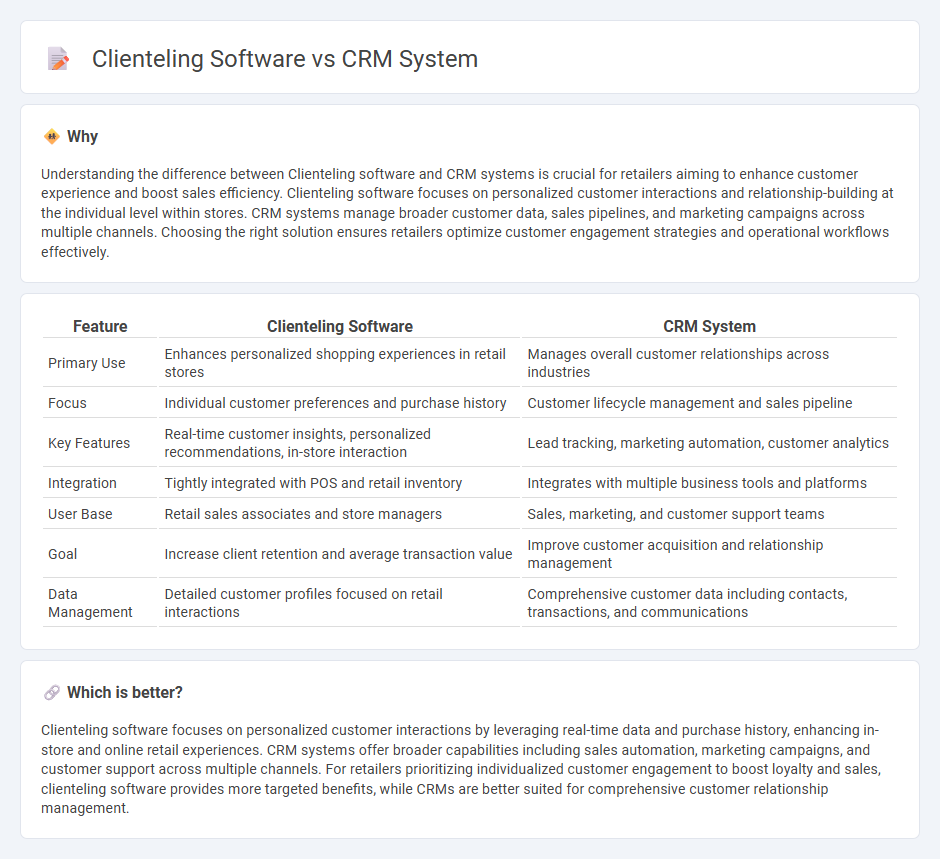
Clienteling software enhances retail customer relationships by providing personalized service through detailed shopper insights, while CRM systems focus on broader customer data management across various business functions. Retailers leveraging clienteling software achieve higher customer retention and increased sales by tailoring interactions based on purchase history and preferences. Discover how integrating clienteling tools can transform your retail strategy and drive customer loyalty.
Why it is important
Understanding the difference between Clienteling software and CRM systems is crucial for retailers aiming to enhance customer experience and boost sales efficiency. Clienteling software focuses on personalized customer interactions and relationship-building at the individual level within stores. CRM systems manage broader customer data, sales pipelines, and marketing campaigns across multiple channels. Choosing the right solution ensures retailers optimize customer engagement strategies and operational workflows effectively.
Comparison Table
| Feature | Clienteling Software | CRM System |
|---|---|---|
| Primary Use | Enhances personalized shopping experiences in retail stores | Manages overall customer relationships across industries |
| Focus | Individual customer preferences and purchase history | Customer lifecycle management and sales pipeline |
| Key Features | Real-time customer insights, personalized recommendations, in-store interaction | Lead tracking, marketing automation, customer analytics |
| Integration | Tightly integrated with POS and retail inventory | Integrates with multiple business tools and platforms |
| User Base | Retail sales associates and store managers | Sales, marketing, and customer support teams |
| Goal | Increase client retention and average transaction value | Improve customer acquisition and relationship management |
| Data Management | Detailed customer profiles focused on retail interactions | Comprehensive customer data including contacts, transactions, and communications |
Which is better?
Clienteling software focuses on personalized customer interactions by leveraging real-time data and purchase history, enhancing in-store and online retail experiences. CRM systems offer broader capabilities including sales automation, marketing campaigns, and customer support across multiple channels. For retailers prioritizing individualized customer engagement to boost loyalty and sales, clienteling software provides more targeted benefits, while CRMs are better suited for comprehensive customer relationship management.
Connection
Clienteling software and CRM systems are interconnected through their shared ability to centralize customer data, enabling personalized shopping experiences and improved customer relationship management in retail. Clienteling tools leverage CRM databases to track purchase history, preferences, and interactions, allowing sales associates to tailor recommendations and communications effectively. Integrating these systems boosts customer loyalty, increases sales conversion rates, and optimizes inventory management by anticipating consumer demand.
Key Terms
Customer Data Management
CRM systems centralize customer data, tracking interactions, purchase histories, and preferences to streamline sales and marketing efforts. Clienteling software enhances this by delivering personalized shopping experiences using real-time data and customer insights gathered from multiple touchpoints. Explore how these tools transform customer data management for tailored engagement and increased loyalty.
Personalization
CRM systems aggregate customer data to create comprehensive profiles, enabling targeted marketing and sales strategies. Clienteling software enhances personalization by delivering real-time, curated recommendations and communication during in-store or digital interactions. Discover how advanced personalization transforms customer engagement by exploring the latest clienteling solutions.
Omnichannel Integration
CRM systems centralize customer data across multiple touchpoints, enabling personalized marketing and sales strategies, while clienteling software specializes in real-time, personalized customer interactions primarily within retail environments to enhance in-store customer experiences. Both solutions integrate omnichannel capabilities but clienteling often incorporates advanced mobile and POS integrations for seamless communication between digital and physical storefronts. Explore comprehensive comparisons to determine which tool maximizes your omnichannel customer engagement and drives loyalty.
Source and External Links
CRM Software Benefits for Small Businesses - A CRM system is software that helps businesses manage customer relationships by storing data like user behavior, purchase records, and communication logs, optimizing sales and marketing processes, and improving customer service across the company.
Customer relationship management - Wikipedia - CRM is a strategic and operational process integrating sales, marketing, and service automation with tools to track customers, automate marketing tasks, and improve service through multiple channels.
What Is CRM (Customer Relationship Management)? | Salesforce US - CRM systems manage all interactions with prospects and customers, unify company data across departments, and often utilize AI to enhance customer lifecycle management for companies of all sizes.
 dowidth.com
dowidth.com